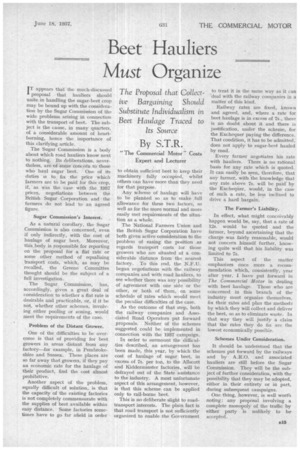Beet Hauliers Must Organize
Page 49

If you've noticed an error in this article please click here to report it so we can fix it.
The Proposal that Collective Bargaining Should Substitute Individualism in Beet Haulage Traced to Its Source
By S.T.R.
"The Commercial Motor" Costs Expert and Lecturer 1T appears that the much-discussed proposal that hauliers should unite in handling the sugar-beet crop
may be bound up with the consideration by the Sugar Commission of the wide problems arising in connection with the transport of beet. The subject is the cause, in many quarters, of a considerable amount of heart: burning, hence the importance of this clarifying article.
The Sugar Commission is a body about which road hauliers know next to nothing. Its deliberations, nevertheless, are 'of some concern to those who haul sugar beet. One of its duties is to fix the price which farmers are to be paid for this crop, if, as Was the case with the 1937 prices, negotiations between the British Sugar Corporation and the farmers do not lead to an agreed figure.
Sugar Commission's Interest. _ As a natural corollary, the Sugar Commission is also concerned, even if only indirectly, with the cost of haulage of sugar beet. Moreover, this body is responsible for reporting on the proposal for a flat rate or some other method of equalizing transport costs, which, as may be recalled, the Greene Committee thought should be the subject of a full investigation.
The Sugar Commission, has, accordingly, given a great deal of consideration to Whether a flat rate is desirable and practicable, or, if it be not, whether other schemes, involving either pooling or zoning, would meet the requirements•of the case.
Problem of the Distant Grower.
One of the difficulties to be overcome is that of providing for beet growers in areas distant from any factory—for example, in Pembrokeshire and Sussex. These places are so far away that growers, if they pay• an economic rate for the haulage of their product, find the cost almost prohibitive.
Another aspect of the problem, equally difficult of solution, is that the capacity of the existing factories is not completely commensurate with the supplies of beet available within easy distance. Some factories sometimes have to go far afield in order to obtain sufficient beet to keep their machinery fully occupied, whilst others can have more than they need for that purpose.
Any scheme of haulage will have to be planned so as to make full allowance for these two factors, as well as for the more normal and more easily met requirements of the situation as a whole.
The National Farmers Union and the British Sugar Corporation have both given active consideration to the problem of easing the position as regards transport costs for those growers who are situated at a considerable distance from the nearest factory. To this end, the N.F.U. began negotiations with the railway companies and with road hauliers, to see whether there was Any possibility of agreement with one side or the other, or both of them, on some schedule of rates which would meet the peculiar difficulties of the case.
As the outcome of that step, both the railway companies and Associated Road Operators put forward proposals. Neither of the schemes suggested could be implemented in connection with the 1937 campaign.
In order to surmount the' difficulties described, Rn arrangement has been made, this year, by which the cost of haulage of sugar beet, in excess of '7s. per ton, to the Allscott and Kidderminster factories, will be defrayed out of the State 'assistance to the industry. A most unfortunate aspect of this arrangement, however, is that this scheme can be applied only to rail-borne beet.
This is no deliberate slight to roadtransport interests. The plain fact is that road transport is not sufficiently organized to enable the Government to treat it in the same way as it can deal with the railway companies in a matter of this kind.
Railway rates are fixed, known and agreed, and, where a rate for beet haulage is in excess of 7s., there is no doubt about it and there is justification, under the scheme, for the Exchequer paying the difference. That condition, it has to be admitted. does not apply to sugar-beet hauled by road.
Every farmer negotiates his rate with hauliers. There is no rational basis for any rate which is quoted. It can easily be seen, therefore, that any farmer, with the knowledge that any rate above is. will be paid' by the Exchequer, would, in the case of such a rate, be less inclined to drive a hard bargain.
The Farmer's Liability.
In effect, what might conceivably happen would be, say, that a rate of 12s. would be quoted and the farmer, beyond ascertaining that the charge was fairly reasonable, would not concern himself further, knowing quite well that his liability was limited to 7s.
This aspect of the matter emphasizes once more a recommendation which, consistently, year after year, I have put forward in The Commercial Motor in dealing with beet haulage. Those who are concerned in this branch of the industry must organize themselves, fix their rates and plan the methods by which they will collect and deliver the beet, so as to eliminate waste. In that way they will justify a claim that the rates they do fix are the lowest economically possible.
Schemes Under Consideration.
It should be understood that the schemes put forward by the railways and by A.R10. and associatedhauliers are still before the Sugar Commission. They will be the subject of further consideration, with the possibility that they may be adopted, either in their entirety or in part, during subsequent campaigns.
One thing, however, is well worth noting : any proposal involving a complete monopoly of the traffic by either party is unlikely to be accepted.




























































































